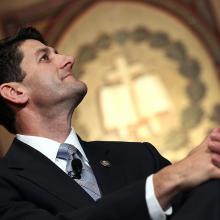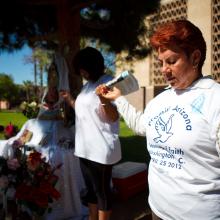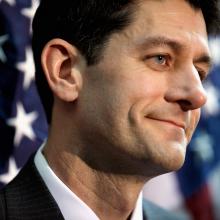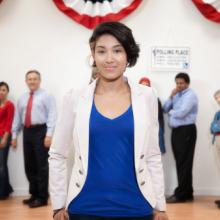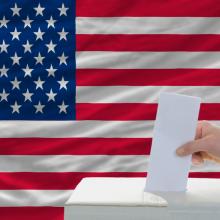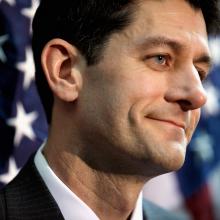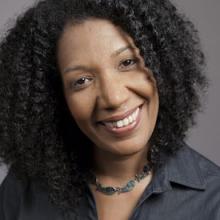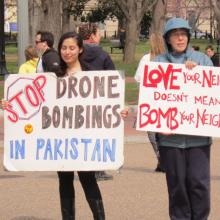2012 election
Speaking at Georgetown University, Rep. Paul Ryan—the chairman of the House Budget Committee and a possible vice-presidential candidate— seemed to seek to quell the debate. He called his budget a roadmap to avoid a debt crisis that will hurt the poor hardest of all.
And he seemed to soft peddle his defense of the document as consistent with Catholic teaching.
“The work I do as a Catholic holding office conforms to the social doctrine as best I can make of it. What I have to say about the social doctrine of the Church is from the viewpoint of a Catholic in politics applying my understanding to the problems of the day,” he told an audience composed mostly of students, faculty and staff.
In the 2012 race for the presidency, religious voters will continue to be watched closely.
According to Gallup’s latest poll, Mitt Romney leads Barack Obama by 17 points among “very religious voters.” These voters are those who attend religious services on a weekly basis (or nearly every week), and are estimated to constitute 41 percent of registered voters.
On the other hand, the report shows that Barack Obama has a 14 point lead among “moderately religious voters” and a 31 point lead among “non-religious voters.”
But this really isn’t anything new. Gallup reports that these findings “reinforce a basic pattern in American voting behavior that has been evident for decades.” The highly religious favor the Republican, the not-quite-as-religious favor the Democrat. This also confirms previous Gallup findings in their "state of the state" report, last month.
Attitudes on two controversial issues are shifting. There is more support for both gun rights and gay marriage in this election cycle than in the previous two, according to a new survey from Pew Research Center for the People & the Press.
Forty-seven percent support legal same-sex marriage, while 43 percent are opposed. Younger adults favor gay marriage by a 65 percent to 30 percent split.
The gun rights issue is equally split, with 49 percent saying it is more important to protect gun rights and 45 percent saying gun control is more important. The largest shift has been among African Americans, which represent a 13-point increase in favor of gun rights.
View the full survey results HERE.
Today, the Supreme Court is hearing a case about the constitutionality of Arizona’s anti-immigrant legislation, SB 1070. It will be months before the case is decided but a broad spectrum of the Christian community already has their minds made up.
This legislation is not just ethically bankrupt but undermines basic Christian values and American ideals. The court will decide whether it is legal, but it is already clear it isn’t moral.
We are both evangelical Christians. One of us is white and one of us Hispanic. It is our common faith commitment, not the color of our skin, that unite us on the need for comprehensive immigration reform and in opposition to patchwork punitive legislation like we have seen in states like Arizona and Alabama.
Rep. Paul Ryan is slated to speak at Georgetown University on Thursday morning. In the lead up, a group of professors and administrators is joining the chorus taking Ryan to task for claiming his budget proposal falls in line with Catholic teaching.
“Our problem with Representative Ryan is that he claims his budget is based on Catholic social teaching,” said Jesuit Father Thomas J. Reese, one of the organizers of the letter. “This is nonsense. As scholars, we want to join the Catholic bishops in pointing out that his budget has a devastating impact on programs for the poor.”
On Thursday, Sojourners launched its 2012 election campaign, Voting For Us, and the Public Religion Research Institute and Berkley Center released its “2012 Millennial Values Survey.” Young Christians, and particularly young evangelicals are a significant demographic to understand. They could be a large “persuadable” population in the run up to the November elections.
What do they believe? What are their priorities? How will they vote?
Young evangelicals are different from their parents and any generation that has preceded them. Their priorities are changing, their world view is shifting and their political engagement is becoming increasingly nuanced – going well beyond the narrow interests of the Religious Right that until now have been associated with evangelicalism in the United States.
As part of the rollout for "Millennial Values Survey" from Public Religion Research and the Berkley Center, I sat at Georgetown University and listened to a very long list of what pollsters think makes up college-age millennials. I’m in the right age bracket, but I couldn’t stop thinking about what a difference just a few years makes.
I’m part of the millennial generation, albeit at the high end of the spectrum. At 29, my attitudes and behaviors look completely different to those on the lower end. Part of it, of course, is phase of life. I’m a professional, married, with a few life experiences under my belt. Most of the respondents of the survey are in college or recently graduated—half live with their parents.
In discussing the survey results with a 23-year-old friend, we worked through both obvious and subtle differences. Some key characteristics of this cohort, and perhaps ways to engage them, surfaced.
In a previous post about the recent ‘Millennial Values Survey,’ I pointed out that young millennials age 18-24 are becoming disillusioned with institutionalized religion.
It’s an anecdotal truth we’ve been throwing around quite a lot lately, but the survey proves the very clear reality that the newest generation of adults is checking the “unaffiliated” box at a rate of one in four.
But young adults aren’t just showing apathy for religion—it’s politics as well.
One in four young millennials (age 18-24) identify themselves as religiously unaffiliated—up from 11 percent in their childhood. But the distinguishing factor for this age group is that the “unaffiliated” label may stick with them into adulthood and beyond.
“This cohort is so dramatically different—racially, ethnically and religiously—it can’t help but change the character of our country,” Daniel Cox, director of research at Public Religion Research Institute, said at the presentation of the “Millennial Values Survey,” conducted by PRRI and Georgetown University’s Berkley Center for Religion, Peace and World Affairs.
In the past, young adults have tended to lapse in faith during their college years and twenties, only to return with age and family. Robert Jones, PRRI founder and CEO, said that’s not likely to happen as much with this age group.
“We’ve got to come up with some new measures of religion,” Jones said.
College-aged adults are not letting their moral beliefs on social issues filter into their politics.
According to the just released “Millennial Values Survey” by the Public Religion Research Institute and Berkley Center for Religion, Peace and World Affairs at Georgetown University, adults age 18-24 are much less likely than their parents to cite social issues like abortion (22 percent) or same-sex marriage (22 percent) as critical.
While the group is split on social issues personally, it doesn’t factor into its political reality. For example, while 51 percent believe abortion is morally wrong, 59 percent believe access to abortion should be legal. Likewise, 48 percent believe sex between members of the same gender is morally wrong, but 59 percent favor allowing same-sex couples to legally marry.
The gap is also evident in their religious affiliation. The percent of religiously unaffiliated jumped from 11 percent in childhood to 25 percent now.
Their attitudes toward Christianity paint a picture of possible motives behind the shift. Two-thirds say that Christianity can be described as “anti-gay,” and 62 percent believe present-day Christianity is “judgmental.”
The full survey will be released this morning at Georgetown University. Check back with Sojourners for more coverage of the findings.
Sandi Villarreal is Associate Web Editor for Sojourners. Follow Sandi on Twitter @Sandi.
For a lot of voters, President Barack Obama’s tenure hasn’t turned out quite as they hoped. On the other side, the presumptive GOP nominee, Gov. Mitt Romney, isn’t the candidate that many voters seem ready to believe in.
Traditional political parties are in decline. In December 2011, Gallup reported that 45 percent of the U.S. population identified as politically independent. At the same time, the direction of our two parties is more and more influenced by political movements like the Tea Party and Occupy Wall Street.
While there is an unprecedented level of money flowing into elections from wealthy donors, corporations and unions, social media has democratized access to fellow voters. You can spend millions of dollars buying airtime on traditional TV stations—but it is entirely possible to craft a compelling message that will reach millions for a relatively small cost.
A politically disillusioned electorate and a huge influx of money for attack ads will be a challenge to our country’s democratic processes. The danger, especially for my generation, is to tune out from political and civic engagement entirely.
The opportunity is post-candidate politics.
A week after House Budget Committee Chairman Paul Ryan claimed his Catholic faith inspired the Republicans' cost-cutting budget plan, the nation’s Catholic bishops reiterated their demand that the federal budget protect the poor, and said the GOP measure “fails to meet these moral criteria.”
That and other strongly-worded judgments on the GOP budget proposal flew in a flurry of letters from leading bishops to the chairmen of key congressional committee.
The letters to Capitol Hill were highlighted in a Tuesday (April 17) statement from the U.S. Conference of Catholic Bishops that came after Ryan, a Wisconsin Republican and rising conservative hero, told an interviewer last week (April 10) that his fiscal views were informed by Catholic social teaching.
Each year, the Stockholm International Peace Research Institute (SIPRI) publishes a study on the amount world governments spend on their militaries. The 2011 report was released this week, showing that all countries together spent $1.7 trillion. The Guardian has a helpful country-by-country data page and interactive map. The top 5 in the world last year, totaling $1.05 trillion, were:
U. S. - $711 billion
China - $143 billion
Russia - $72 billion
Britain - $63 billion
France - $62 billion
In contrast, the budget for UN Peacekeeping operations for fiscal year July 2011-30 June 2012 is about $7.84 billion. That’s 0.5 percent of what the world spends on its militaries.
It’s a stark example of the world’s misguided priorities.
A new survey released today shows that President Barack Obama holds a narrow lead over Gov. Mitt Romney in economic issues among voters—a topic that eight in 10 voters believe to be very important.
The Pew Forum on Religion and Public Life reports that on economic issues, 49 percent of voters favor Obama while 45 percent favor Romney. In these statistics, Romney holds a 53-point lead among white evangelicals and a 20-point lead among white Catholics, while Obama garners strong support from black Protestants and the religiously unaffiliated.
As voters head to the polls in November, numbers show that for many voters, issues of employment and the economy will take priority over social issues like gay marriage and abortion.
Faith and fishing: two central parts of Louisiana’s vibrant coastal culture. Every April, going back generations, you can see them intersect in a celebration of bayou life at the annual Blessing of the Fleet in Chauvin, La. Families welcome the opening of the year’s first shrimp season by coming together to pray for family and friends who depend on the seafood industry, and for a healthy ecosystem that yields a bountiful catch.
“We pray for the safety and welfare of all fishermen,” said Fr. Frederic Brunet, pastor of St. Joseph Catholic church who has presided over the event for many years. “Bless the shrimp and crabs and help us to catch a lot of them.”
This year saw the second blessing since the BP Oil Spill shut down the Gulf fishing industry in 2010. Since then, many shrimpers have reported problems: poor catches and startling irregularities (such as shrimp with no eyes).
On November 21, 1967, General William Westmoreland, U.S. commander in Vietnam, delivered a speech at the National Press Club on war strategy. “We have reached an important point when the end begins to come into view,” he said, and outlined a “new phase” in the war where the U.S. would:
- Help the Vietnamese Armed Forces to continue improving their effectiveness.
- Help the new Vietnamese government to respond to popular aspirations and to reduce and eliminate corruption.
- Help the Vietnamese strengthen their policy forces to enhance law and order.
Then came what is now known as the Tet Offensive. On January 30, 1968, the National Liberation Front launched attacks against cities and towns throughout South Vietnam. It was the beginning of the end, the evidence that U.S. strategy had failed.
Fast forward 45 years. U.S. strategy in Afghanistan emphasizes assisting the Afghan army and police forces to improve their effectiveness along with working to reduce corruption in the government. We hear encouraging speeches from politicians and generals. We’re told the end is in sight.
Several months ago I was blessed to meet a young man, Marcus, whose story is not unlike so many young African American young men who find themselves on the other side of a prison cell.
Marcus lived a challenging life, made some bad choices and was convicted of a non-violent drug possession charge. What makes his story different is that he found a new way forward. Just before his release on parole, Marcus was connected to a mentorship program that encouraged artists who were incarcerated. This mentorship program was created by one faithful person who takes seriously the charge to “Remember those who are in prison, as though you were there in prison with them…” (Hebrews 13:3).
From the fall of the Berlin Wall in November 1989 to the dissolution of the Soviet Union in December 1991, the Cold War ended. But U.S. policymakers apparently still haven’t gotten the news.
This meeting of the Summit of the Americas in Cartagena, Colombia, last weekend ended without the usual official declaration because U.S. policy refuses to include Cuba, while a broad range of other governments in the Americas supports an invitation. The final vote was 32-2 for Cuba’s inclusion in future meetings, with only the U.S. and Canada opposed.
Reuters noted: “U.S. insistence that Havana undertake democratic reforms before returning to the hemispheric family led to a clash with a united front of leftist and conservative governments that see Washington's policy toward Cuba as a relic of the Cold War.”
It’s long past time for the U.S. to realize that the Cold War is over, that Cuba exists, and that inclusion will foster change faster than exclusion. Even the Vatican realizes that, as Pope Benedict’s recent trip to Cuba demonstrated.
Editor’s note: The following written testimony was submitted by Lisa Sharon Harper, on behalf of Sojourners, to be included in today’s U.S. Senate Committee on the Judiciary Subcommittee on the Constitution, Civil Rights, and Human Rights Hearing on “Ending Racial Profiling in America.”
As a Christian organization, Sojourners is compelled to consider the pattern and institution of racial profiling practices abhorrent and a direct threat to the maintenance and cultivation of the inherent dignity of every human being living and working within the boundaries of the United States. We believe every human being is made in the image of God and therefore equally worthy of protection of human and civil rights under the law. Racial profiling not only threatens the psychological and emotional well-being of targeted communities. As demonstrated above, the practice can lead to death.
Last week, anonymous U.S. officials told the media that the U.S. military wouldn't stop the drone-launched missile attacks, which they have been carrying out for years within Pakistan.
Discouraging news, indeed. But we all need encouragement, so here's a little good news—images of a chance encounter of a peace-building kind.
